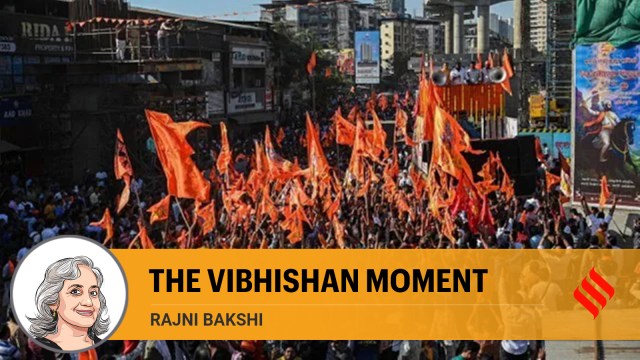
The election campaign is again, poignantly, coinciding with Ram Navami celebrations. Lord Ram, in the guise of a political icon, is quite visibly caught in the fray. This is precisely why Ram Navami comes as a relief. The festival invites us to take a break from the furious public contestation about which political party has or has not adequately honoured Lord Ram. Over several centuries, Bhakti poets have lovingly expressed the beautiful irony of that which is beyond time and space, without beginning or end. Goswami Tulsidas’ Ramcharitmanas is virtually dedicated to this divine paradox.
How can we draw on this legacy in ways that help us now? Help us, at the very least, not to be swept away by the contestations around us. And be able to live with courage and love. Perhaps the most stark manifestation of the divine paradox in Ramcharitmanas is when Ram faces Ravan on the battlefield. The contrast can be seen in two dimensions. The most obvious is that of the exiled prince of Ayodhya, standing barefoot with no armour and only a bow and arrow as a weapon. Facing him is the mighty King of Lanka on a massive chariot and a huge arsenal of weapons.
At the subtle level is the Lord of Creation facing a devotee who has acquired so much earthly power that it has made him arrogant and blindly confident. Vibhishan, Ravan’s younger brother, seeing the reality at this subtle level has pleaded with Ravan to bow at the feet of Ram and return Sita. Having failed in this effort, and being kicked by Ravan, Vibhishan joins Ram. However, when Ram and Ravan finally stand in direct confrontation, Vibhishan is overwhelmed by reality. What if Ravan on his powerful chariot succeeds in defeating Ram and his poorly equipped army? This is when Tulsidas perceives Ram comforting Vibhishan by instructing him on what is the chariot of victory.
Bravery and patience are the wheels of this chariot. Strength, wisdom, self-control and altruism are its four horses which are held by the reins of forgiveness, empathy and equanimity. Truth and good conduct are the pole and flag. The pure and tranquil mind is the quiver which holds the arrows of self-control, non-aggression and discipline. Ram tells Vibhishan, one who has this chariot of righteousness triumphs over the cycle of life and death — by comparison, victory over Ravan is a trivial matter. It would be a sad cop-out to say “oh well, ordinary people can barely aspire to these ideals, let alone live by them.” On the contrary, the “Vibhishan moment” remains important even if Ram’s Chariot of Victory seems too lofty a goal.
The Vibhishan moment is when a person has chosen truth and risk over the lies and comforts of inherited loyalty. Walked away from so-far unbeaten power, to stand on the side of courage and uncertainty. The danger of the Vibhishan moment is that you may feel so overwhelmed by the asymmetry of a contest that your perception of reality shrinks.
Perhaps this is why Ram Navami brings relief. In temples across India, when idols of baby Ram are lovingly decorated and placed in cradles, to the accompaniment of joyous chanting and singing, it is a celebration of our own yearning. Our yearning to seek the divine both formless and with form. Our yearning to be courageous and keep the faith in a time of darkness. Our knowing that in this limited “sthool jagat” or material reality, now, the chariot of victory depends on each one of us.
Can we keep the ideal alive in our hearts and not lose faith even when our practice is far from perfect? Even when we fail to stop injustice, can we still resist?
It might help to seek fellowship with the “kevat”, the boatman, through whom Tulsidas depicts yet another aspect of the divine paradox. Tulsidas’s kevat is blessed with the awareness that the prince of Ayodhya standing before him is actually Vishnu. It is the kevat who needs Ram to safely carry him across this tumultuous ocean of emotions, “bhav sagar”, that is the human condition. Yet in that moment, by the river bank, it is the Lord of the Universe who needs the kevat.
In the days ahead, our striving for love is the kevat and courage is the boat.
Bakshi is the author of Vivekananda and Our Times: From Fear to Love


